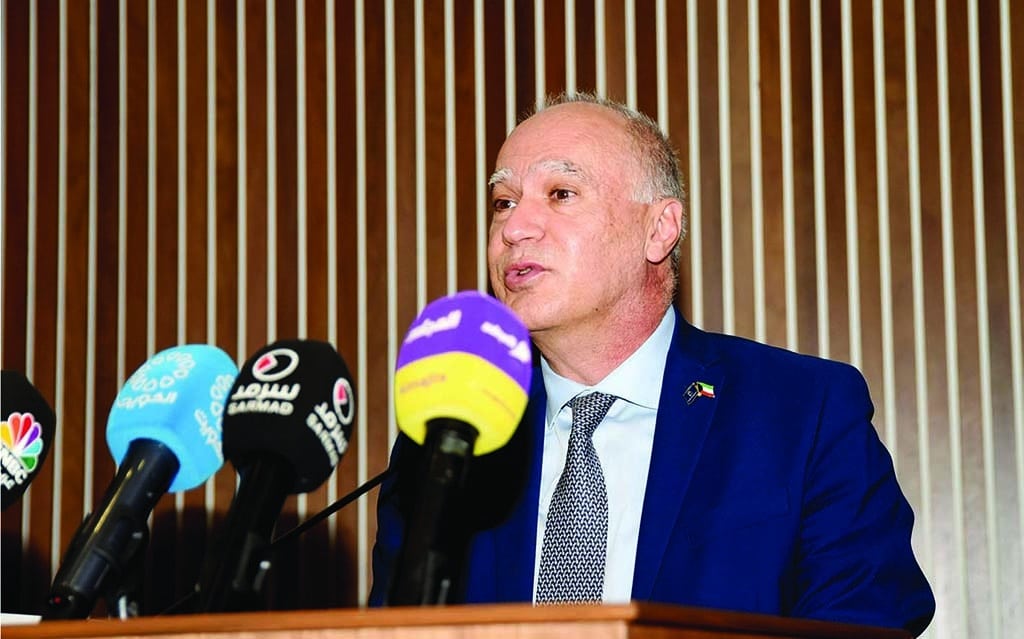By Majd Othman
KUWAIT: Kuwait Economic Society (KES) on Wednesday hosted a seminar in partnership with the College of Business Administration at Kuwait University and the World Bank Country office in Kuwait to discuss the World Bank Economic report for the GCC countries (Spring 2022). Issam Abousleiman, World Bank Country Director of the GCC countries, Middle East and North Africa, said that the World Bank report which was issued under the title of "Achieving Pledges Related to Climate Change" describes the economies of the GCC countries that have succeeded in recovering from the COVID-19 pandemic during 2021 and early 2022.
"In this report, we focus particularly on the steps needed to move towards a new low-carbon growth model, including reconsidering energy subsidies and fiscal consolidation, and the importance of obtaining appropriate prices for an enabling environment that can put the private sector at the forefront of the new growth model," he said.
Abousleiman noted that international pressure due to the war in Ukraine and economic sanctions may lead to additional investments for GCC countries to expand oil and gas production in an additional effort to support the energy security of major importers, particularly the GCC countries with significant spare capacities such as Saudi Arabia and the United Arab Emirates, adding "This will lead to a real dilemma, as it may delay the necessary diversification towards a non-hydrocarbon economy in the GCC countries."
 KUWAIT: A view of the audience attending the seminar organized by the Kuwait Economic Society (KES) on Wednesday.
KUWAIT: A view of the audience attending the seminar organized by the Kuwait Economic Society (KES) on Wednesday.The World Bank report expected Kuwait to achieve a growth rate of 5.7 percent by the end of the first half of this year, indicating that the growth is expected to decline by 3.6 percent during the year 2023 and then to 2.5 percent during the year 2024. Meanwhile, the real GDP is expected to grow by an average of 3 percent in 2023/2024 due to the increase in oil exports and the credit growth.
The report expected that the consumer price index (inflation) would reach 3.6 percent during the current year, while it will return to 2.8 percent next year, and then to 2.3 percent during the year 2024. It said that oil production would increase by 8.6 percent during the current year with OPEC+ raising production quotas and increasing the production capacity of the Al-Zour refinery.
While the report predicts a large surplus in Kuwait's total public financial balance to 13 percent of the GDP this year, which would allow a partial settlement of the arrears amounting to $7.7 billion owed by the Ministry of Finance, other ministries and public authorities. The report pointed out that it is more appropriate for Kuwait to take advantage of the opportunity of the public financial conditions to diversify the economy from oil and push towards structural reforms.
 KUWAIT: Chairman of the Board of Directors at Kuwait Economic Society, Khaled Al-Mutairi speaks.
KUWAIT: Chairman of the Board of Directors at Kuwait Economic Society, Khaled Al-Mutairi speaks.In his opening speech, Chairman of the board of directors of Kuwait Economic Society, Khaled Al-Mutairi said that the society will continue its active role by using independent professional methods to overcome the challenges that are facing Kuwait's national economy, through positive interaction and meaningful dialogue with specialists and those who are interested in economic affairs.
He pointed out, "After the GCC countries have witnessed a sharp decline in economic growth in 2020 due to the COVID-19 pandemic, they were able to overcome the crisis through vaccination campaigns and easing the restrictions related to the pandemic, which resulted in the economic recovery in 2021 in all the GCC countries."
 KUWAIT: Dean of the college of business administration at Kuwait University, Mohammad Zainal
KUWAIT: Dean of the college of business administration at Kuwait University, Mohammad ZainalHe added, "Public financial deficits witnessed a remarkable improvement. It is expected that the GCC countries will achieve growth in economic activity in 2022." Dean of the College of Business Administration at Kuwait University, Mohammad Zainal, said that the current developments such as challenges and new work programs imposed on the government institutions and private sectors, on regional, local, and international levels, which must be dealt with.
"The College of Business administration at Kuwait University continuously seeks to have an effective and essential role in supporting reform and economic development programs by providing solutions and alternatives to overcome economic and social challenges in partnership with the World Bank to support the Kuwaiti economy through exchange of experiences and studies," he mentioned.











